The rise and stumbles of the San Fernando Valley Latino political machine
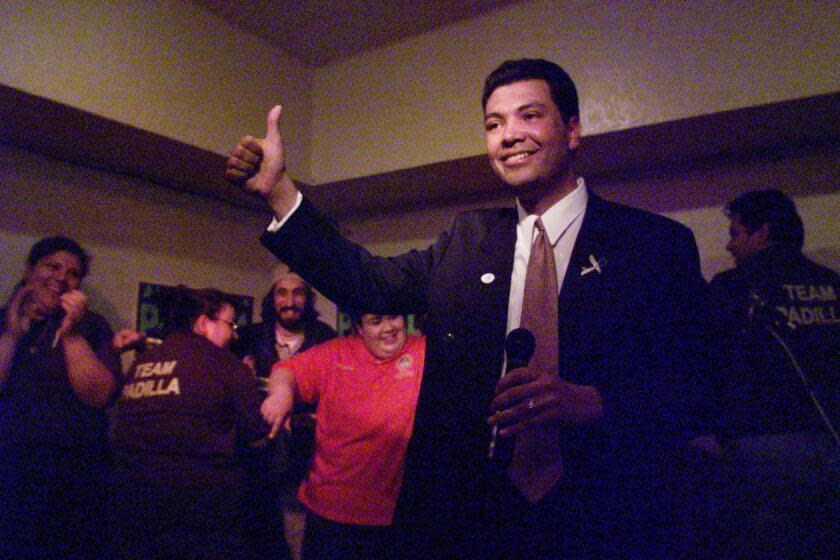
- Oops!Something went wrong.Please try again later.
- Oops!Something went wrong.Please try again later.
Second in a four-part series on how Latino political power has changed Los Angeles
PART II: THE SAN FERNANDO VALLEY MACHINE SPEAKS
Alex Padilla was a 22-year-old managing his first election campaign when advisors issued a challenge: Make sure the kickoff party for your guy has at least 100 guests.
The candidate in the 1995 assembly race: Tony Cárdenas, who had never run for office before. They seemed like a political odd couple. Cárdenas, 10 years Padilla's senior, was a strapping real estate agent. The tall, deep-voiced Padilla wrote satellite software for Hughes Aircraft.
The two had known each other less than a year but hit it off immediately. They were the sons of Mexican immigrants who settled in Pacoima and attended Mary Immaculate Catholic Church.
Elementary school? Telfair. High school? San Fernando High, where white teachers and counselors told them they would never amount to anything.
Both left the northeast San Fernando Valley for college — Cárdenas graduated from UC Santa Barbara and Padilla from MIT. Each realized the only way to make things better for the Valley’s growing Latino community, in an era of anti-immigrant sentiment across California, was to elect politicians who looked like them.
Cárdenas would be their test run.
“And so I had the sense to start with making three phone calls,” Padilla told me over Zoom. “I called one of Tony’s brothers, because Tony is the youngest of 11. So I figured between the siblings, their spouses and their kids, we're going to get a good chunk.”
He called another friend who came from a family of 11. And then another big family.
“When the political advisors came in," Padilla continued, "they were like, ‘Man, how’d you pack the room on short notice?'”
He let a beat pass, then grinned.
“That's how we roll.”
Cárdenas easily won, becoming the first Latino state legislator from the San Fernando Valley. Today, he’s a congressman and Padilla is California’s first Latino U.S. senator. The duo, who room together in D.C., frequently cite that initial campaign as the template they used to construct an L.A. political dynasty worthy of the British royals.
Two years after Cárdenas’ win, Padilla successfully managed the state Senate campaign of Richard Alarcon, who became the Valley’s first Latino council member until Padilla replaced him in 1999. As Cárdenas and Padilla spent the next decade hopping between Sacramento and City Hall, their campaign volunteers — almost all fellow San Fernando Tigers — became their staffers, then elected officials who followed the playbook of their bosses.
“When you leave Pacoima, nine times out of 10, you don't come back,” Cárdenas told me last fall at Myke’s Cafe, a Pacoima pool hall turned hip Mexican American diner that features photos of him and Padilla near the entrance. “You're like, ‘I'm out. I'm in Santa Clarita. I’m like "The Jeffersons," you know? I'm moving on up and moving on out.’ ”
He stopped to dilute his horchata with water.
“But I came back. Alex came back. A handful of us came back.”
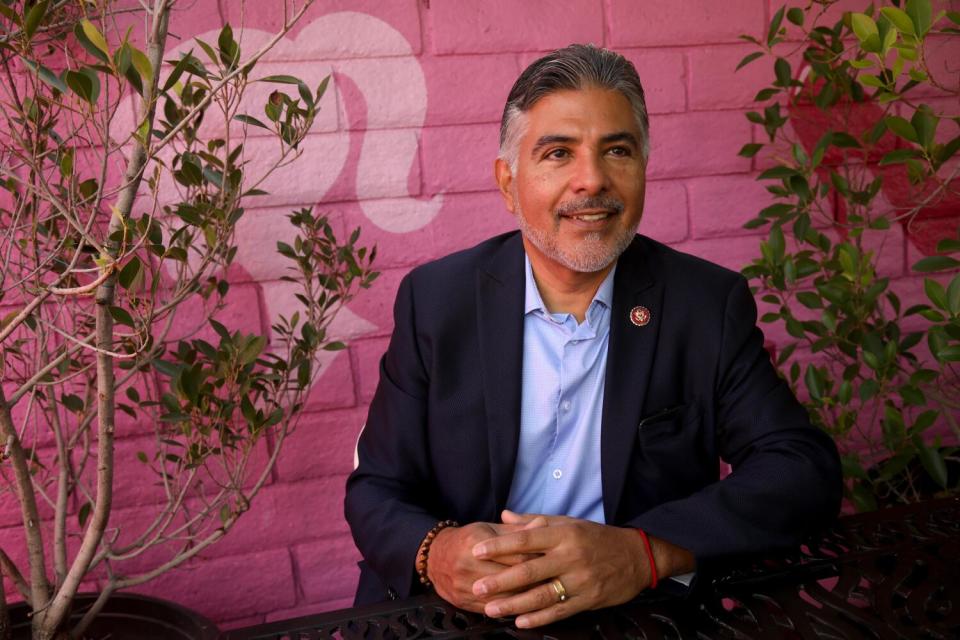
The Cárdenas-Padilla dynasty has so dominated Valley life that Councilmember Imelda Padilla (no relation to Alex) didn’t realize the region “had something special going on” until she left for UC Berkeley in the late aughts and heard her Chicano Studies classmates talk about running for office in their hometowns.
“Their communities never had had representation,” she said. “And to be very honest, I just kind of had an assumption that every community was like mine.”
In Southern California political circles, the Valley Latino network is spoken of in jealous tones. It's frequently contrasted with the Eastside, which has produced L.A.'s only Latino mayor in modern times, two state Assembly speakers and a state Senate leader in an overwhelmingly Latino region — but only after decades, and in spite of endless squabbles. Cárdenas and Padilla, by contrast, created their empire in a less-Latino area within a generation, making sure to clip any potential internecine drama — or push out those who got in the way.
Read more: The political trees of Latino Los Angeles
Cárdenas didn’t flinch when I asked if he was offended at the word "machine."
“Please think of us like people used to view the Berman-Waxman machine,” he responded.
He was referring to former U.S. Reps. Henry Waxman and Howard Berman, political kingmakers whose chosen candidates ruled the Valley while Cárdenas was growing up.
“Look at those guys," he continued. "They're really going out there helping people get elected, participating in democracy at the highest levels. They meant [machine] in a positive way. ... I don't want people to make it seem like it's a negative.”
But recently, the Cárdenas-Padilla political clan has wobbled like never before.
The trouble started last fall after the leak of a secretly recorded conversation that captured then-council president Nury Martinez, then-Councilmember Gil Cedillo, Councilmember Kevin de León and then-Los Angeles County Labor Federation president Ron Herrera talking about how to grow Latino political power at the expense of Black power.
The most racist remarks were uttered by Martinez, who served for years under Cárdenas and Padilla as a get-out-the-vote wizard before running for office herself.
Throughout the secretly recorded conversation, Martinez complained that outside forces were stopping Latinos from gaining a third council seat in the Valley.
“Don’t mess up the Valley," Martinez said at one point, "‘cause we’re cool in the Valley." She resigned within days of the tape's release.
A few weeks after my conversation with Cárdenas, he announced that this term would be his last. He has endorsed San Fernando Valley Assemblymember Luz Rivas to replace him in Congress. The news stunned the Valley's political watchers, who are wondering why the 60-year-old Cárdenas wants to step away from something he and Padilla so carefully built.
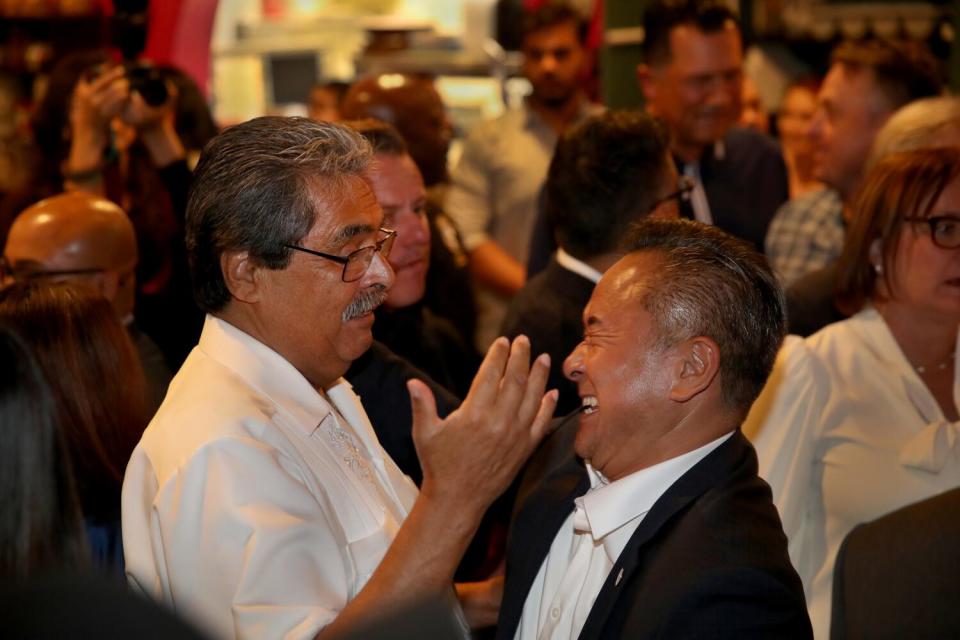
For decades, Latinos in the San Fernando Valley were a community twice ignored.
Pushed by redlining and segregation into the industrialized northeast communities of Pacoima, Sun Valley and the city of San Fernando, they barely registered a blip in popular depictions of the region as America's suburb. They were ignored by local politicians and, cut off from the Eastside, barely figured in discussions about Latinos in Los Angeles.
When James Acevedo moved to the Valley in the 1980s to work as a deputy for Assemblymember Richard Katz, he found an “insulated community much more in touch with their Mexican roots” than his native East L.A.
“They needed political power,” said Acevedo, who interned for political giant Gloria Molina. “They needed influence. They needed someone to listen to them.”
That someone was Richard Alarcon, a former high school teacher who by the time he ran for City Council in 1993 was a deputy to Mayor Tom Bradley. Acevedo registered thousands of new Latino voters, while Alarcon sold himself to white residents as a Valley native first and a Latino incidentally, winning by fewer than 300 votes.
Alarcon and Acevedo then got behind Cárdenas’ first Assembly campaign — the one Padilla was managing. Once in Sacramento, Cárdenas roomed with Assemblymembers Cruz Bustamante and Richard Polanco, the Eastside politico who was then chair of the Latino Legislative Caucus.
“They were my teachers,” Cárdenas said. “They taught me you can't sit there and have a beer and talk about how we're going to change the world. You got to put your heart and soul into it.”
Cárdenas hired Padilla as his district director while giving him time off to help on campaigns across California. Sleeping on floors in offices, the wunderkind gained the experience he needed to manage Alarcon’s uphill 1998 state Senate race. Helped by a last-minute $181,500 Polanco donation, Alarcon beat Katz — Acevedo’s old boss — by 31 votes in the Democratic primary, then easily won the general election.
“As time went on,” Padilla said, “we were intentional about the type of people we were trying to work with." That meant enlisting friends and staffers with their same pedigree and ideals to run.
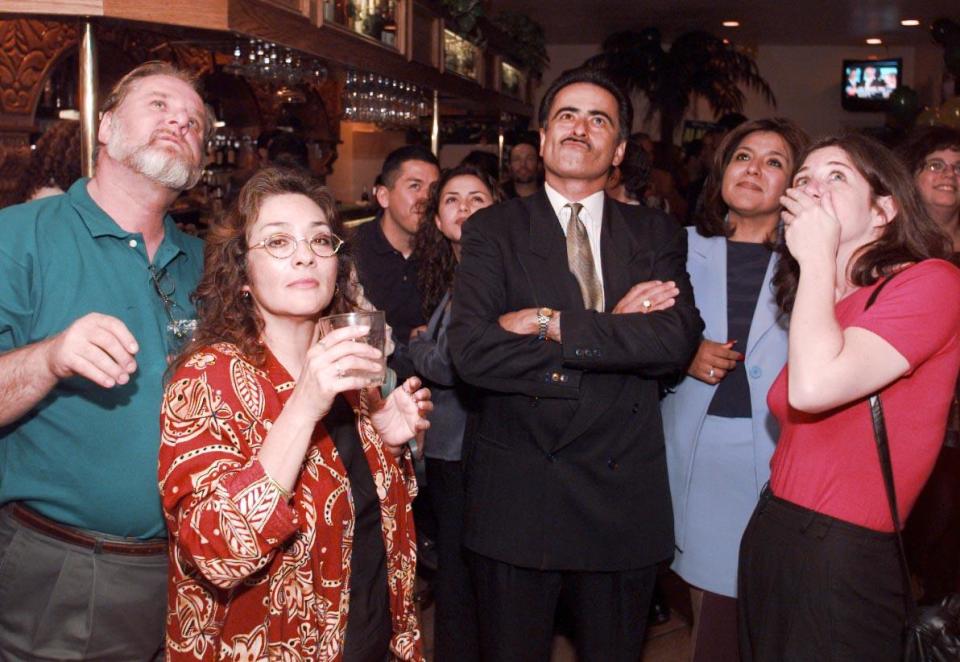
But when Padilla decided to run for Alarcon's open City Council seat, Alarcon balked — Padilla was too young and inexperienced, he argued.
“Richard's a good guy," Cárdenas said. "Richard has done wonderful things as an elected official. But from my vantage point, he very quickly lost the vision about" what they were supposed to do.
Padilla easily beat Alarcon's chosen candidate and became L.A.’s youngest council president two years later at 28. He used his newfound power to help James Hahn beat Antonio Villaraigosa in the 2001 mayoral race. The following year, Padilla called on Villaraigosa and other Eastside leaders to fight off Valley secession.
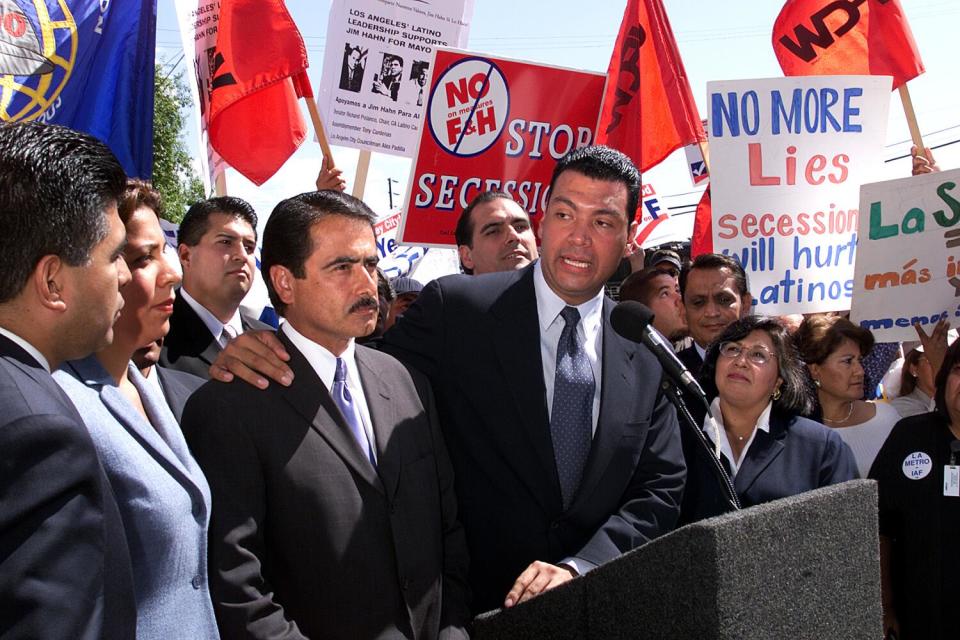
At a news conference in Mission Hills a month before the secession vote, Padilla spoke as L.A.'s Latino leaders looked on. On his left were Eastside royalty — Molina, Villaraigosa, then-Assemblymember Cedillo — and newcomers, including City Atty. Rocky Delgadillo and LAUSD board member Jose Huizar. To the right were the Valley upstarts: Cárdenas, San Fernando Mayor Cindy Montañez and Alarcon.
"Sometimes, some of us don't walk in lockstep," Molina told reporters. "But on this issue, we are united, we are strong, and we are going to work hard to defeat the secession drive."
Alarcon served in Sacramento and City Hall for 11 more years until his career ended after jurors found him and his then-wife guilty of voter fraud. The convictions were later overturned, but his banishment from the movement he helped to foster was permanent.
In a back booth at James Restaurant in San Fernando, Alarcon was philosophical about his exile.
“Tony voted for all my stuff, and so [the split] didn't stop the work,” he said. “I didn't want to name the next elected officials. I just wanted to create the path."
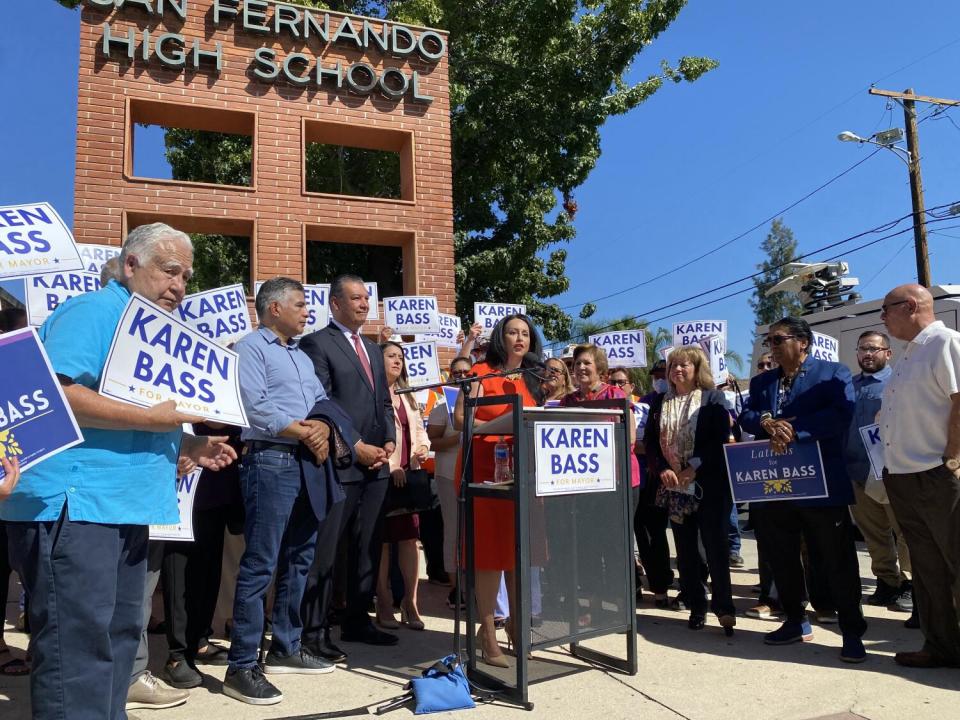
By the mid-aughts, Cárdenas and Padilla were planning for the second generation of Valley Latino candidates. They gathered weekly with other players to talk shop, bouncing around what Padilla joked was the Valley's “diner circuit” until the meetings moved to their homes because “we couldn't go places without constantly being interrupted.”
Acevedo, rich from his day job as a developer, retreated from the spotlight once critics began to accuse him of being a puppet master.
“The only thing we wanted to do was become part of the political establishment,” he said. “There was nothing nefarious about it."
Eastside politicians began to approach Padilla for favors instead of the other way around once he became California’s first Latino secretary of state in 2013, the same year Cárdenas joined Congress. In Padilla's telling, they admitted their envy at what the duo had created.
“[They said], ‘Yeah, we had a good thing going on the Eastside, but we couldn't pull it together. We ended up with a lot of infighting. You guys don't repeat that, all right?' ”
Cárdenas credits "tremendous discipline" and "not losing sight of 'it's not about me', it's we" for their crew's success.
But their pupils tested that resolve.
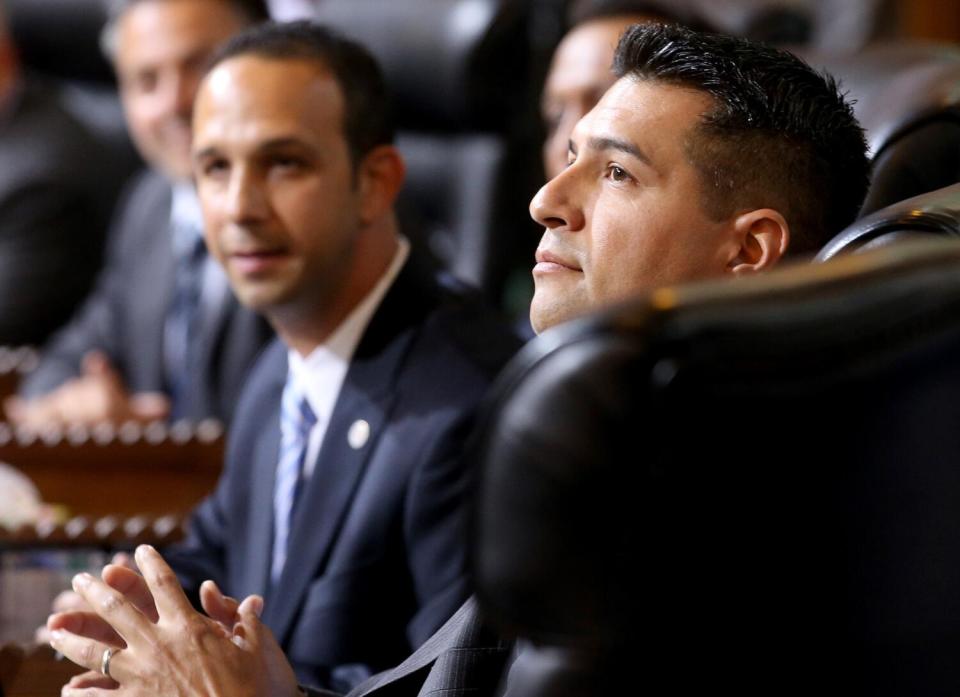
Felipe Fuentes, whose family was at Cárdenas' first campaign kickoff and who went on to serve as a deputy mayor, Padilla's chief of staff and an assemblymember, surprised his mentors by stepping down from his council seat in 2016 to work as a lobbyist. Fuentes' former chief of staff, Raul Bocanegra, resigned from the Assembly in 2017 after a Times investigation found a trail of sexual harassment allegations against him.
Then there was Martinez, as brilliant and hard-nosed a political mind as Padilla and married to Gerry Guzman, a former district director for Fuentes and Bocanegra. She joined the L.A. Unified school board in 2009, then beat Montañez — ostracized by the machine after losing to Padilla in a state Senate primary — in 2013 to succeed Cárdenas on the City Council.
Martinez became council president in 2020, the second Latino to do so after Padilla. Voluble and not afraid to wield her newfound power, she was the stylistic opposite of her mentors — but she followed their Valley game plan. She became the public face of the Valley machine and appeared with Cárdenas, Padilla and Rivas at a news conference in 2022 to endorse Karen Bass for mayor. The location? Their alma mater, San Fernando High.
Two months later, The Times broke the story about the secretly recorded tapes.
Read more: Inside the room: The entire L.A. City Council racist audio leak, annotated by our experts
That same day, Padilla called Martinez and asked her to resign. "It’s best you hear it from me before you hear it through the press," he said he told her.
The U.S. senator called her again the following day with the same appeal. When she wouldn’t budge, he went public with his request. She lasted two more days.
The two were close enough that they vacationed together with their spouses. Cárdenas and Padilla had tolerated Martinez's brusqueness because she was one of them, even as underlings warned that she would eventually embarrass the group. When it finally happened, Padilla had no regrets about asking for her resignation.
“We know why we're doing this and why we're building this,” Padilla said of the scandals that have hit his squad, “and when there’s someone who falls short of that through conduct, it's heartbreaking. It takes away from the agenda or the progress.”
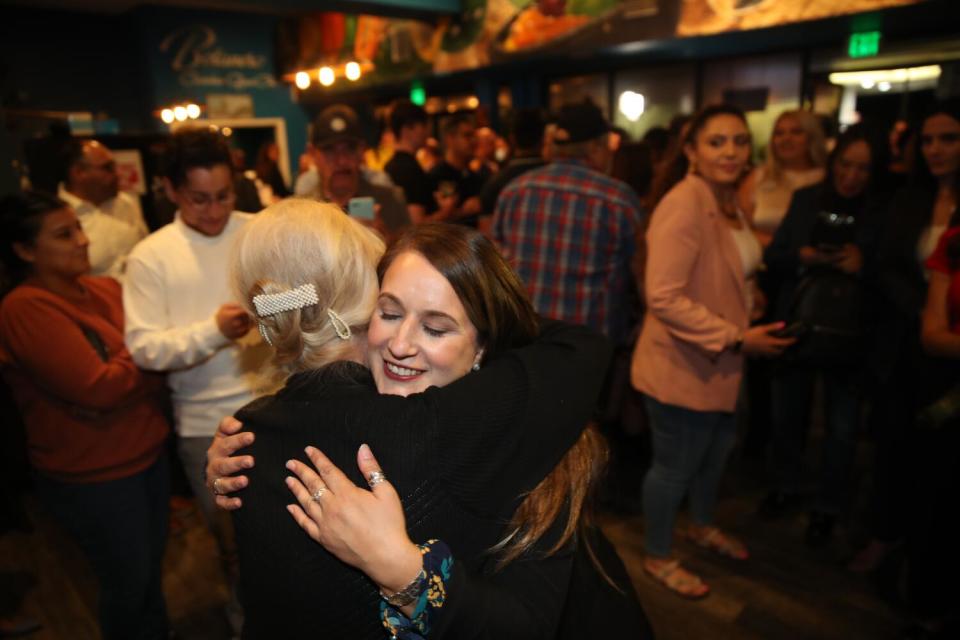
The third generation of Valley Latino political power was crowned last year, when Imelda Padilla won the special election to replace her former boss, Martinez. She handily beat Marisa Alcaraz, another Valley native who once worked for Alarcon and was endorsed by Montañez, the former assemblymember who was back on the San Fernando City Council until her death last year at age 49. Imelda's chief of staff is Ackley Padilla, Alex's brother, who held the same position under Martinez.
Cárdenas offered congratulatory words, as did Valley congressmember Brad Sherman and L.A. County Supervisor Lindsay Horvath. Councilmembers John Lee and Marqueese Harris-Dawson were in attendance, as was Acevedo, clad in a white guayabera.
One of Imelda's supporters was state Sen. Caroline Menjivar, a former Marine who won her seat in 2022. The only elected Valley Latino officials who endorsed Menjivar were Councilmember Monica Rodriguez, a former Alarcon aide, and L.A. Unified school board member Kelly Gonez, who defeated Imelda for the seat in 2017.
Menjivar is the daughter of Salvadoran immigrants who grew up in Reseda. Although she had once worked as a staffer for Martinez, those bona fides weren't enough for Cárdenas. He backed her opponent, Daniel Hertzberg, who was running to replace his father, Bob Hertzberg.
“I didn’t go to San Fernando High, but I’m worthy of my own experiences,” Menjivar wryly said. She's the first person of Central American descent and the first LGBTQ+ Latina to represent the Valley in Sacramento. “It was hard to get here because I was the outsider. Some of them [the Valley's elected Latino officials] didn’t even take my calls, and it broke my heart.”
She has moved past that slight and hopes that Cárdenas, Alex Padilla and their protégés will accept more outsiders like her.
"If me, Tony, Monica, Kelly and Imelda get together, we’re going to get everyone involved," Menjivar said. "But we have to really, really work together. And you can do that without bringing anyone else down.”
In our conversation at Myke's Cafe, Cárdenas looked back and also toward the future. In his decade on Capitol Hill, he secured tens of millions of dollars in federal funds for Valley nonprofits and led the main fundraising arm for the Congressional Hispanic Caucus' political action committee.
His announcement that he was backing Rivas to replace him revealed the short bullpen that he and Padilla have. The two, along with Rivas, are supporting an outsider, San Fernando Mayor Celeste Rodriguez, for Rivas' old Assembly seat. They picked her over one of their own: Walter Garcia, a San Fernando High graduate and former communications director for Councilmember Monica Rodriguez.
The day we talked, Cárdenas said nothing about his decision to leave elected office.
But I knew something was going on with him. He spoke with such forceful candor about his legacy over our hour-long conversation that we never even ordered lunch.
"It gives me goose bumps to know that the vision that we had back then" paid off, Cárdenas said.
When I asked if he wanted to replicate the Valley way across the United States, Cárdenas responded with one word:
"Absolutely."
This story originally appeared in Los Angeles Times.

